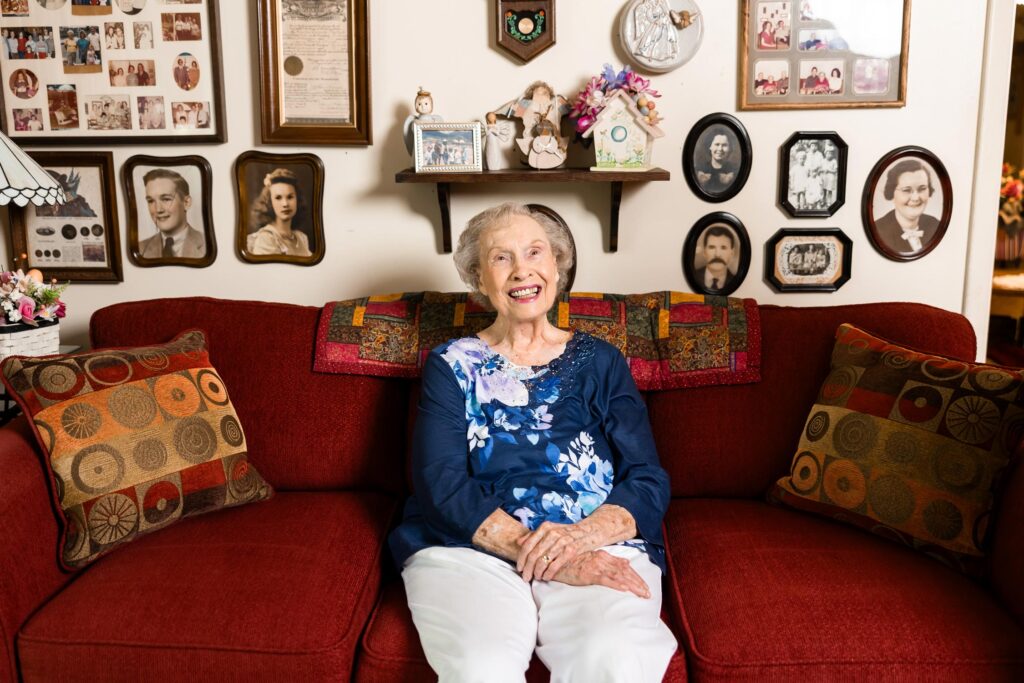You care deeply for your aging parent and want to manage everything yourself. What begins as love can lead to burnout before you notice the warning signs. Preventing caregiver burnout starts with recognizing that fatigue, guilt, and mounting stress aren't character flaws but signals your body and mind are overwhelmed. Are you sleeping poorly despite feeling exhausted? Do small frustrations now trigger disproportionate reactions? Have you stopped doing things you once enjoyed because caregiving consumes every moment?
Key Takeaways:
- Preventing caregiver burnout requires understanding that burnout causes chronic exhaustion that doesn't improve with rest, unlike everyday stress.
- Early warning signs include persistent mood shifts, disrupted sleep, constant tiredness, loss of interest in activities, and frequent illness.
- Effective self-care strategies include prioritizing adequate sleep, eating nutritious meals, daily physical movement, and scheduling regular quiet time.
- Setting clear boundaries protects your time, energy, and mental health while allowing you to provide better care for your loved one.
- Sharing caregiving tasks, utilizing respite care services, and involving family members reduces burden and creates sustainable arrangements.
- Professional support through therapy, caregiver support groups, and wellness programs provides essential relief and practical coping strategies.
Understanding Caregiver Burnout
Preventing caregiver burnout begins with understanding how it differs from ordinary stress. Stress typically comes and goes, often lifting after a break or a good night's sleep. Burnout sneaks up gradually, builds over extended periods, and lingers despite rest. It drains energy, compromises health, and erodes hope.
Caregivers experiencing burnout often stop enjoying activities they once loved, feel trapped in their role, or struggle to control emotional responses. This represents more than simply having a difficult day; it signals a chronic condition requiring intervention.
Recognizing Early Warning Signs
Constant irritation serves as a common early warning when preventing caregiver burnout becomes necessary. Tasks that once felt manageable now seem overwhelming. Small issues trigger disproportionate reactions. Feeling exhausted even after sleeping indicates another red flag.
Changes in eating patterns often accompany burnout. Some skip meals due to time pressures, while others overeat to cope with stress. Sleep becomes light, disrupted, or insufficient. Getting sick more frequently provides another clue. Recurring headaches, digestive problems, or persistent body aches may appear.
Research shows that ignoring these symptoms typically leads to worsening outcomes, while seeking support early helps prevent burnout from progressing. Initially, burnout clouds thinking and leads to poor decisions. Over time, these patterns raise risk for serious health problems, including heart disease, high blood pressure, and clinical depression.
Managing Emotional Exhaustion and Guilt
Guilt weighs heavily on most family caregivers. Many expect perfection from themselves and mentally link quality care with never needing breaks. Watching someone you love suffer causes pain, and wanting temporary relief triggers feelings of wrongness or selfishness.
However, guilt often signals deep caring rather than failure. Shifting perspective on guilt from viewing it as a character flaw to recognizing it as evidence of love can bring greater peace and support, preventing caregiver burnout. Anger commonly emerges when stress accumulates and personal needs remain consistently unmet. Experiencing anger doesn't indicate inadequacy; it confirms your humanity.
Learning to observe difficult emotions without being controlled by them proves essential. Step away for a brief walk or practice deep breathing. Write thoughts in a journal or call someone you trust. Regularly asking yourself "How do I feel right now?" helps bring emotional clarity and builds resilience.
Essential Self-Care for Preventing Caregiver Burnout
Many caregivers believe they must always be present. They fear nobody else can provide adequate care. This pressure harms both caregiver and care recipient. Breaks improve energy levels, make caregiving tasks easier, and allow genuine kindness to return to interactions; breaks also assist in preventing caregiver burnout. Warning signs indicating the need for respite include constant fatigue, mood swings, loss of interest in activities, and ongoing illness.
Daily Habits That Protect Your Health
Adequate sleep restores energy and supports clear thinking. Nutritious food helps your body maintain strength through demanding days. Choose vegetables, fruits, proteins, and whole grains when possible. Quick, healthy snacks like yogurt, fruit, or nuts provide energy during busy periods.
Physical movement improves mood and helps your body process stress more effectively. Even brief walks or stretching sessions provide measurable benefits. Quiet time allows racing thoughts to settle. Even ten minutes in a calm environment can reset your nervous system.
Preventing Caregiver Burnout With Consistent Self-Care
Structure supports wellness when daily life feels unpredictable. Schedule specific times for movement, healthy eating, and reflection each day. Set phone alarms or use planners as accountability tools. Simple starting points include brief morning stretches, protein-rich lunches, or journaling before bed.
Short, affirming phrases provide comfort and perspective. Many caregivers find strength in reminders like "You can't pour from an empty cup." Checklists help manage tasks and create order when life feels chaotic. Mood logs reveal patterns in emotional well-being, helping you identify when rest or additional support becomes necessary.
Establishing Boundaries and Asking for Help
Clear personal limits help caregiving remain sustainable. Boundaries protect your time, energy, and mental health while ultimately improving the quality of care you provide. Time for yourself isn't selfish; it's necessary for preventing caregiver burnout. Block calendar time for meals, hobbies, and adequate sleep just as you would medical appointments.
| Boundary Type | Example | Benefit |
|---|---|---|
| Time Boundaries | “I’m available until 4 PM” | Protects personal time, reduces resentment |
| Task Boundaries | “I handle medical, you handle finances” | Prevents overwhelm, shares responsibility |
| Emotional Boundaries | “I need 30 minutes alone before discussing problems” | Preserves emotional energy |
| Physical Boundaries | “I need one full day off weekly” | Ensures rest, prevents exhaustion |
Overcoming Barriers to Requesting Support
Common obstacles preventing caregivers from seeking help include guilt, need for control, fear of judgment, and pride. Needing help doesn't indicate failure. It demonstrates you're protecting both yourself and the person you care for. Start with small requests like asking someone to pick up groceries or provide an hour of companionship.
Family members may not fully understand your daily stress level. Explain what's needed in specific, concrete terms. Create a detailed task list and allow each person to select responsibilities matching their capabilities. One sibling might handle medical appointment scheduling while another commits to weekly visits. Use shared calendar apps to track assignments, avoiding confusion.
Preventing Caregiver Burnout With Respite Care
Respite care allows someone else to provide temporary care for your loved one so you can rest or recharge. These breaks represent lifelines rather than luxuries, proving essential for preventing caregiver burnout.
Types of Respite Care Services
In-home respite involves trained aides coming to your home so you can rest or leave. Adult day programs offer meals, safety, and social activities during daytime hours. Short-term residential stays provide temporary care in facilities for several days, allowing extended breaks for caregivers.
Daily Stress Management: Preventing Caregiver Burnout
Four-count breathing exercises help ease racing thoughts. Sit comfortably. Inhale through your nose for four seconds. Hold for four seconds. Exhale slowly for four seconds. Hold again for four seconds. Repeat five times. This slows the heart rate and reduces anxiety.
Brief physical movement helps too. A short walk or gentle stretching can lift energy and reduce tension. When performing routine tasks, focus attention fully on each motion. This mindfulness builds present-moment awareness that naturally lowers stress levels and supports preventing caregiver burnout through sustainable daily practices.
When to Seek Professional Help
Don't wait for a crisis before requesting professional support. Seek help when stress feels persistent, rest becomes inadequate, or physical health begins deteriorating. A trusted physician can provide referrals to therapists specializing in caregiver issues.
Support groups reduce feelings of isolation by offering space to share experiences and learn from others in similar situations. Online groups accommodate tight schedules, while in-person meetings add community connection. These groups help caregivers realize their feelings are normal responses to extraordinary demands.
Physical and Emotional Consequences
Caregiver burnout creates measurable health effects. Risk increases substantially for heart disease, high blood pressure, and clinical depression. Skipping personal doctor visits, missing meals, or getting inadequate sleep all take cumulative tolls. The immune system weakens, making illness occur more frequently.
When caring for a spouse, relationship dynamics shift dramatically. You may feel more like a nurse than a partner, creating emotional distance. Talking openly with a therapist or joining a support group specifically for spousal caregivers helps you feel less alone.
Steps Toward Healing
Recovery from caregiver burnout starts with rest and gentle self-care. Schedule appointments with both your primary physician and a mental health professional. Join support groups to hear from others experiencing similar challenges. Return to physical movement gradually with small steps. Establish regular sleep schedules and eat nutritious meals.
Look at happy photographs or reflect on times you felt proud or helpful. Writing down one positive moment daily helps rebuild emotional fuel. When caregiving concludes, grief counseling or caregiver transition groups help process this complex life change.
Frequently Asked Questions About Preventing Caregiver Burnout

How can I tell if I'm experiencing burnout or just normal tiredness?
Normal tiredness improves with adequate rest. Burnout persists despite sleeping and taking breaks. Additional indicators include losing interest in activities you previously enjoyed, feeling emotionally numb, experiencing persistent irritability, frequent illness, and feeling trapped without hope for change. If exhaustion continues despite rest or you no longer find meaning in caregiving, these suggest burnout.
Is it normal to feel angry toward the person I'm caring for?
Yes, these feelings are common responses to caregiving stress and demands. Anger doesn't mean you don't love your family member or that you're a bad caregiver. It typically indicates your needs aren't being met and you're overwhelmed. Acknowledging these feelings without shame represents the first step. Consider joining a support group and exploring respite options to reduce daily pressure.
How much respite care is appropriate?
Appropriate respite varies based on your situation and needs. Many caregivers benefit from several hours weekly, plus occasional full days or weekends off. Your loved one isn't neglected when receiving professional care in your absence. Regular breaks actually improve care quality by preventing caregiver burnout, allowing you to return more patient and capable.
What if my family doesn't understand why I need help?
Many families underestimate caregiving demands until clearly educated about daily realities. Schedule a family meeting to describe specific daily tasks, time commitments, and how caregiving affects your health. Bring written lists showing everything you do. Be specific about the help needed. If family remains unsupportive, seek outside help through respite services or professional care managers.
Practical Steps for Preventing Caregiver Burnout
Step One: Assess Your Current Situation. Complete an honest self-assessment of physical health, emotional well-being, and warning signs you're experiencing. Track sleep quality, mood patterns, physical symptoms, and activities you've abandoned. Identify specific caregiving tasks causing the most stress. Schedule annual physical exams and be honest with your doctor about caregiving stress and symptoms.
Step Two: Build Your Support Network. Identify potential helpers within family, friends, and professional services. Make specific requests rather than waiting for offers. Research local respite care options, including adult day programs and in-home care agencies. Schedule regular respite, starting with small amounts like two hours weekly. Join at least one caregiver support group, either in-person or online.
Step Three: Establish Non-Negotiable Self-Care Routines. Identify three daily self-care practices you commit to maintaining: adequate sleep, one healthy meal, and brief physical movement serve as good foundations. Block these on your calendar as you would medical appointments. Set clear boundaries with family about your availability. Practice saying no to additional commitments that would compromise your well-being.
Preventing Caregiver Burnout at CareLink
Preventing caregiver burnout protects both your health and your ability to provide quality care for your aging loved one. Recognizing warning signs early, implementing sustainable self-care practices, and accessing appropriate support resources make the difference between caregiving that feels sustainable and caregiving that leads to collapse.
At CareLink, we understand the complex challenges facing family caregivers throughout central Arkansas. We recognize that caring for aging parents or spouses creates extraordinary demands that few people anticipate. Our approach emphasizes connecting family caregivers to comprehensive support services, educational resources, and community programs designed specifically for preventing caregiver burnout.
We help families access respite care services, support groups, counseling, and care coordination that honor both the caregiver's needs and the care recipient's well-being. Whether you're just beginning your caregiving journey or feel yourself approaching burnout, appropriate support creates meaningful differences in sustainability and quality of life.
Preventing caregiver burnout isn't selfish; it's essential for providing the best possible care over time. Visit our caregivers page to learn more about support services available in your area, or contact our team to discuss how we can help you build a sustainable caregiving plan. You don't have to do this alone.





